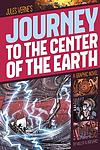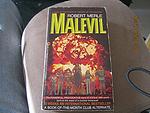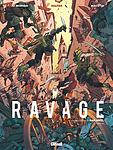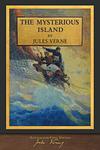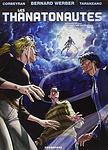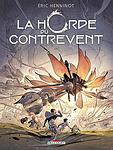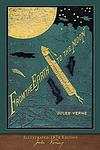The Greatest French "Science fiction" Books of All Time
Click to learn how this list is calculated.
This list represents a comprehensive and trusted collection of the greatest books. Developed through a specialized algorithm, it brings together 284 'best of' book lists to form a definitive guide to the world's most acclaimed books. For those interested in how these books are chosen, additional details can be found on the rankings page.
Genres
Science fiction is a genre of literature that explores the potential consequences of scientific and other innovations on society and individuals. It often features futuristic or imaginary settings, advanced technologies, and scientific concepts that are not yet fully understood or realized. Science fiction can encompass a wide range of themes, including space exploration, time travel, artificial intelligence, and alternate realities. It is a genre that allows authors to speculate on the future of humanity and the impact of scientific progress on our lives.
Countries
Date Range
Reading Statistics
Click the button below to see how many of these books you've read!
Download
If you're interested in downloading this list as a CSV file for use in a spreadsheet application, you can easily do so by clicking the button below. Please note that to ensure a manageable file size and faster download, the CSV will include details for only the first 500 books.
Download-
1. Twenty Thousand Leagues Under the Sea by Jules Verne
This classic science fiction novel follows the adventures of Professor Aronnax, his servant Conseil, and harpooner Ned Land as they are captured by the enigmatic Captain Nemo aboard the Nautilus, a technologically advanced submarine. As they journey 20,000 leagues under the sea, they encounter a variety of sea creatures and underwater phenomena. The narrative explores themes of exploration, scientific discovery, and man's relationship with nature.
-
2. Journey to the Center of the Earth by Jules Verne
This science fiction novel revolves around a German professor who believes there are volcanic tubes leading to the center of the Earth. He, his nephew, and their guide embark on an adventurous expedition down an Icelandic volcano into the Earth's core. They encounter prehistoric animals, natural disasters, and otherworldly phenomena along their journey. The expedition is both thrilling and dangerous, testing the limits of their courage and survival skills.
-
3. Malevil by Robert Merle
Set in the aftermath of a devastating nuclear war, the novel follows a group of survivors who find refuge in a medieval castle named Malevil. The survivors, led by the protagonist, must navigate the challenges of rebuilding their lives in a drastically altered world. They grapple with issues of survival, community, morality, and leadership as they encounter other groups of survivors with different philosophies and intentions. The story is a gripping exploration of human resilience, the will to maintain civilization, and the complexities of interpersonal relationships in a post-apocalyptic setting.
-
4. Ravage by René Barjavel
Set in a dystopian future where technological civilization has collapsed following a catastrophic event, the narrative follows a group of survivors as they navigate a world plunged into chaos. With all modern conveniences and social structures gone, the protagonist, a young man, leads a band of people from the ruins of Paris to his ancestral home in Provence, hoping to rebuild a simpler, agrarian-based society. Along the way, they face numerous challenges, including the regression of humanity to barbarism and the struggle to maintain their own humanity in the face of desperation. The story is a cautionary tale about the fragility of civilization and the enduring power of nature and human resilience.
-
5. The Immortals by René Barjavel
"The Immortals" is a science fiction novel that explores the consequences of a groundbreaking discovery: a serum that grants eternal youth. As the serum becomes a coveted resource, it drastically alters society, leading to a chasm between the immortal elite and the aging population. The narrative delves into themes of power, inequality, and the ethical dilemmas of immortality, while following the lives of those who seek to control the serum and those who are affected by its existence. The story raises profound questions about the nature of life, death, and the true cost of eternal life.
-
6. The Mysterious Island by Jules Verne
This novel follows the adventures of five prisoners of the American Civil War who escape by hijacking a balloon and crash-landing on an uncharted island in the Pacific. Using their skills and knowledge, they endeavor to survive and master the island's resources, uncovering its secrets along the way. Their ingenuity in the face of adversity, the discovery of a mysterious benefactor, and encounters with pirates weave a tale of exploration, survival, and the triumph of human intellect and camaraderie against the odds. The story is a testament to the enduring human spirit, the value of scientific knowledge, and the mysteries that the natural world holds.
-
7. Empire Of The Ants by Bernard Werber
In this novel, readers are plunged into a fascinating and complex world beneath their feet, where an ant civilization thrives with its own sophisticated society, technology, and culture. The story intertwines the lives of these ants with the human world, particularly through the experiences of a family that inherits a mysterious apartment in Paris, which hides secrets linked to the ant empire. As the narrative unfolds, the book explores themes of coexistence, the nature of intelligence, and the intricate balance of ecosystems, challenging the reader to consider the world from an entirely different perspective and to question humanity's place within the grand scheme of life.
-
8. Les Thanatonautes by Bernard Werber
The book explores the adventures of a group of pioneering scientists who embark on an experimental journey to map the realm of death, which they term "Thanatonautes." By inducing near-death experiences, they navigate through successive levels of the afterlife, each with its own challenges and landscapes, in an attempt to uncover the secrets of what lies beyond life. Their quest for knowledge pushes the boundaries of science and spirituality, leading to profound insights about the human soul and the mysteries of existence, while also raising ethical and philosophical questions about the consequences of tampering with the unknown.
-
9. Les Racines Du Mal by Maurice G. Dantec
The book is a dark and complex thriller set in the near future, where a series of gruesome murders has gripped Europe. The narrative follows a troubled detective with a cybernetically enhanced brain as he tracks a serial killer whose crimes are linked to a sinister biotechnology corporation. As the investigation deepens, the detective uncovers a web of conspiracy that challenges the boundaries of human nature and technology, leading to a chilling exploration of the roots of evil and the potential horrors of a post-human world.
-
10. La Horde Du Contrevent by Alain Damasio
The book is a French science fiction novel that follows a group of intrepid explorers, known as the Horde, as they embark on an epic quest against a relentless, omnipresent wind to reach the mysterious source of the wind at the far end of their world. The narrative is uniquely structured, with each member of the Horde providing their own perspective, and the story delves into themes of camaraderie, human resilience, and the struggle against nature. As the characters face physical and existential challenges, the novel explores the depths of human experience and the bonds that form in the face of adversity.
-
11. The Possibility Of An Island by Michel Houellebecq
The novel explores the life and thoughts of a successful comedian who, disillusioned with the superficiality and decay of human relationships in a hedonistic society, becomes involved with a cult that seeks immortality through cloning and genetic manipulation. As the narrative alternates between the comedian's experiences and the reflections of his future cloned descendants, it delves into themes of existential despair, the search for meaning, and the consequences of eternal life. The story weaves a bleak and satirical tapestry of humanity's obsession with youth, sex, and death, ultimately questioning the very nature of human progress and happiness.
-
12. Planet Of The Apes by Pierre Boulle
In this thought-provoking novel, a group of astronauts crash-land on a planet where apes are the dominant species and humans are primitive creatures. The story follows the protagonist as he struggles to survive and understand this upside-down world, ultimately challenging the reader's notions of civilization, intelligence, and the nature of humanity.
-
13. From The Earth To The Moon by Jules Verne
"From The Earth To The Moon" is a science fiction novel that follows the ambitious plan of a group of American Civil War veterans to launch a projectile to the moon. Set in the late 19th century, the story explores the scientific and technical challenges faced by the characters as they strive to achieve this extraordinary feat. The book delves into the themes of human curiosity, determination, and the boundless possibilities of scientific advancement.
Reading Statistics
Click the button below to see how many of these books you've read!
Download
If you're interested in downloading this list as a CSV file for use in a spreadsheet application, you can easily do so by clicking the button below. Please note that to ensure a manageable file size and faster download, the CSV will include details for only the first 500 books.
Download
